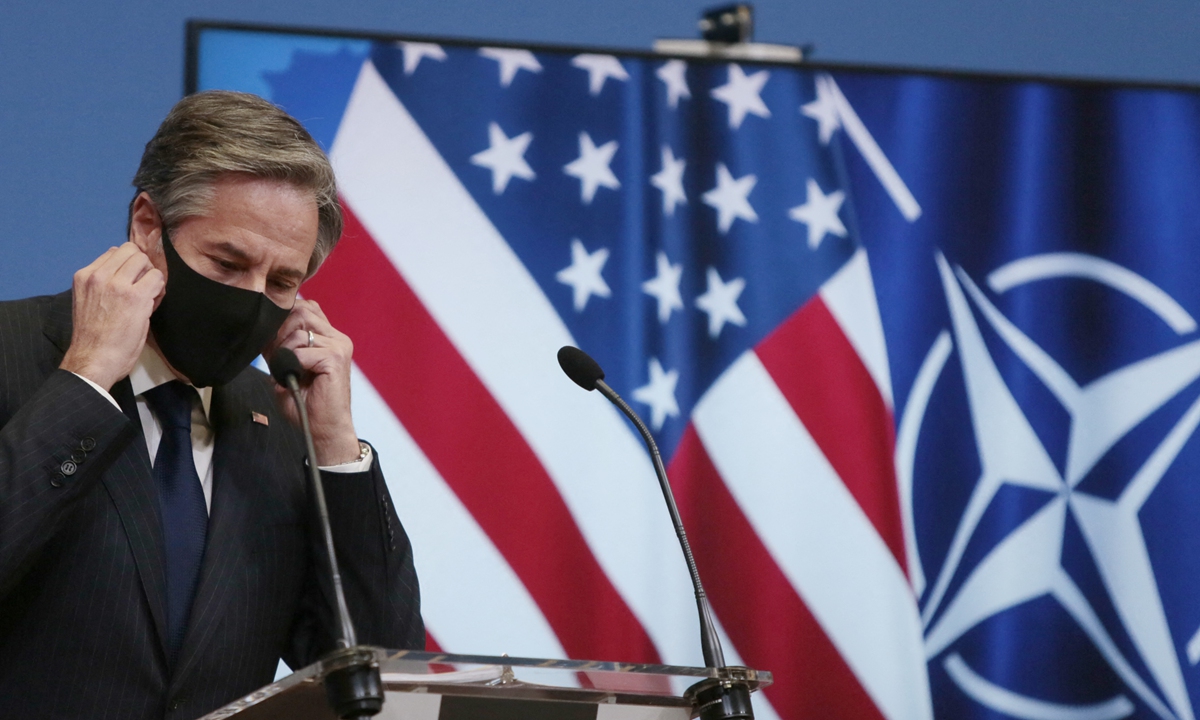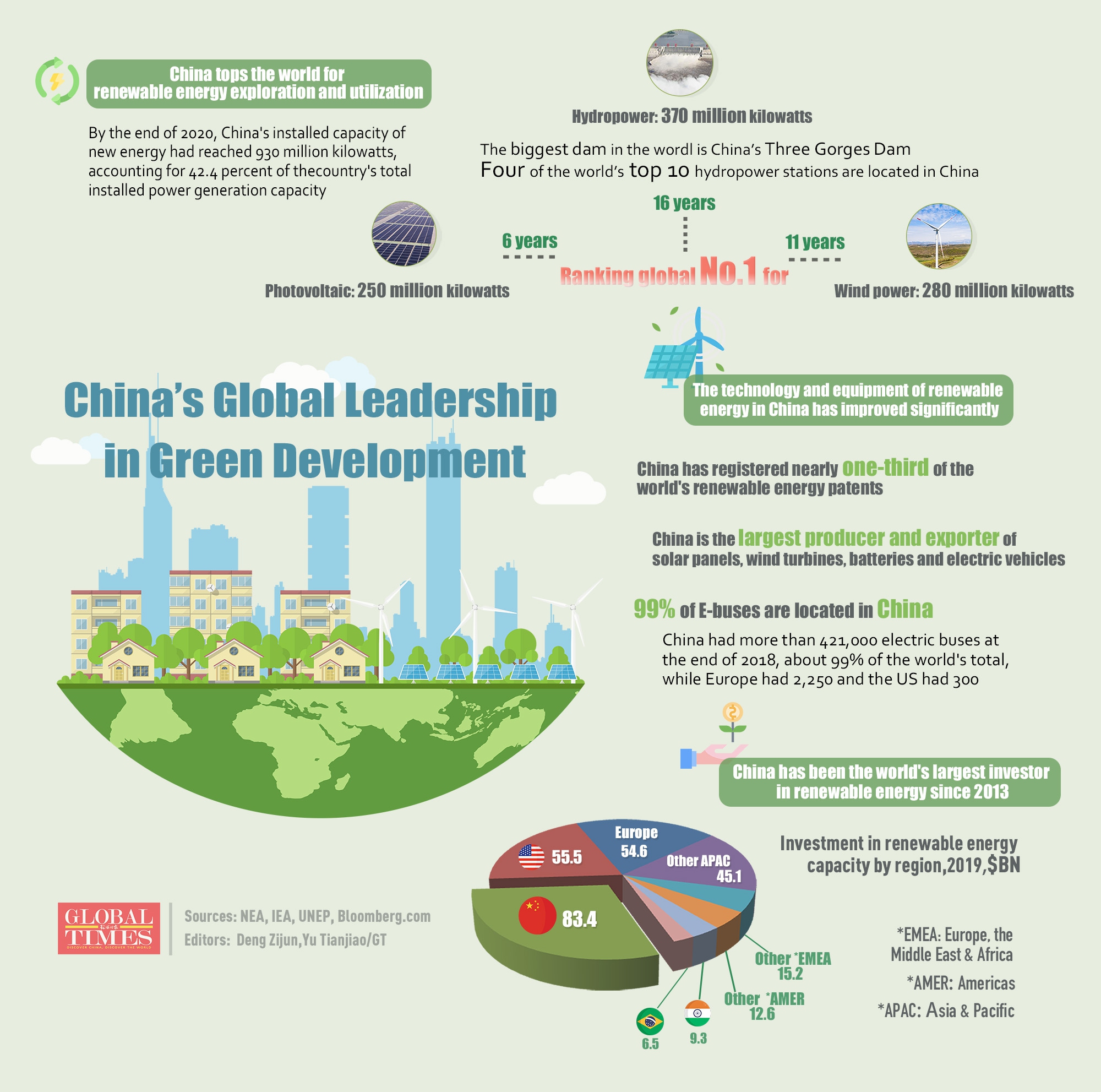US climate leadership in question in upcoming summit as its flip-flops pose threat to global efforts

US Secretary of State Antony Blinken gives a press briefing at the end of a NATO Foreign Ministers' meeting at the Alliance's headquarters in Brussels, Belgium, on March 24.
Between China and the US signing a joint statement to address the climate crisis last week and US President Joe Biden's virtual climate summit to tout his administration's green policies this week, top US diplomat Antony Blinken fired unkind signals to urge Washington to take the lead in the green energy field in a move to combat China.
Graphic: GT
The mixed signals fired by Washington regarding China-US climate cooperation expose its "anxiety" toward China's leading role in the clean energy field, said Chinese analysts. They urged the US to discard its Cold War mentality when it comes to climate cooperation. Otherwise, it will drag climate change, one of the few fields where the two countries can cooperate, into stalemate and also lead to further spiraling down of frayed ties, they warned.On Monday, US Secretary of State Antony Blinken said that "it's difficult to imagine the United States winning the long-term strategic competition with China if we cannot lead the renewable energy revolution. Right now, we're falling behind."
His statement came two days after US special envoy for climate John Kerry concluded his three-day visit to China where he met with his Chinese counterpart Xie Zhenhua, during which the two issued a joint statement on tackling the climate crisis together.
It seems the positive tone of the joint statement is not enough for some American politicians to forego a competitive, or even hostile line against China on climate issues, Li Haidong, a professor at the Institute of International Relations of the China Foreign Affairs University, told the Global Times.
"It reflects US anxiety toward China on the climate issue. Washington was expecting its reentry into global climate circles will endow it with leadership in this field, and it was only when the US returned to the global climate framework that it realized how big the gap is with China in terms of the green economy," Li said.
Blinken's speech served as an introduction ahead of Biden virtually hosting 40 world leaders this week for a global summit on climate change, expected to take place on April 22 and 23. China has yet to make clear whether its leaders will be participating.
In his virtual meeting with German Chancellor Angela Merkel and French President Emmanuel Macron on Friday, Chinese President Xi Jinping reiterated China's goal to peak its carbon dioxide emissions by 2030 and achieve carbon neutrality by 2060.
In the race to tackle the climate challenge, China has the edge over the US in terms of lowering the costs of renewable energy R&D, manufacturing capacity and high-tech development, Yang Fuqiang, a senior adviser on climate change, energy and environment at the National Resources Defense Council, a US-based environmental group, told the Global Times on Tuesday.
Chinese firms reacted positively to the country's carbon neutrality goal. Tech firm Tencent launched a carbon neutrality plan in January this year, with Pony Ma Huateng, Tencent founder and CEO, vowing to explore the application of science in reducing emissions.
Tech giant Huawei supported Ningxia Baofeng Energy Group in building a solar power system in 2016, which was estimated to have reduced emissions of carbon dioxide by 2.047 million tons, equal to planting around 89 million trees.
China has a clear lead in terms of the underlying technology, with well over 150,000 renewable energy patents as of 2016, 29 percent of the global total. The next closest country is the US, which had a little over 100,000 patents, according to a 2019 report issued by the Global Commission on the Geopolitics of Energy Transformation, which was set up by the International Renewable Energy Agency.
Beijing has steadily increased renewable energy and green economy development, while the US has undermined itself in the climate race due to its retreat from the global climate framework over the past four years, Lü Xiang, a research fellow on US studies with the Chinese Academy of Social Sciences in Beijing, told the Global Times.
He said by glad-handing world leaders into participating in the US-organized summit, the Biden administration wants to shore up its global leadership on this issue, which again puts the US and China into the same competitive ring.
"Blinken's speech connotes a signal that the at some point if it finds difficult to joust with China in this field, the US may again wield the weapon of sanctions to target our green economy sectors," Lü said, warning that if the US follows through on this, it willjeopardize climate cooperation and exert a heavy blow on bilateral ties, which are already frayed by issues such as trade and human rights.
Filibuster dilemma
Blinken's speech that links China to the US' green energy revolution aims to quell opposition voices within the US and sends a signal to those in opposition that it is time to unite and compete with China, Li said.
Last week, Biden invited a bipartisan group of lawmakers to discuss his $2.3 trillion infrastructure plan, which focuses on clean energy. Republican lawmakers object to the size and scope of Biden's plan, and they have the president's climate agenda in their crosshairs, US media reported.
Lü pointed out that some Republicans worry that giving up fossil fuel will impair the US' competitiveness and reduce employment. "Unlike China which has a consistent and smooth system for implementing orders from above, the US ambition to push forward a green energy revolution may be watered down by partisan divide."
Chinese analysts said that although the US' seemingly active gesture in the global climate arena has won it some plaudits, some in the global community are still cautious about welcoming it back. Its previous frequent retreats and returns to the global climate framework have greatly diminished the global efforts in fighting climate change, and the unpredictability of the next US government's policy is holding potential climate partners back, they said.
"The US itself is the biggest uncertainty in global efforts to curb climate change, so it's hard to see if Biden can live up to the expectations of undertaking global leadership via the summit," Li said. "He may set up the stage, but it's hard to say who plays the leading role."




